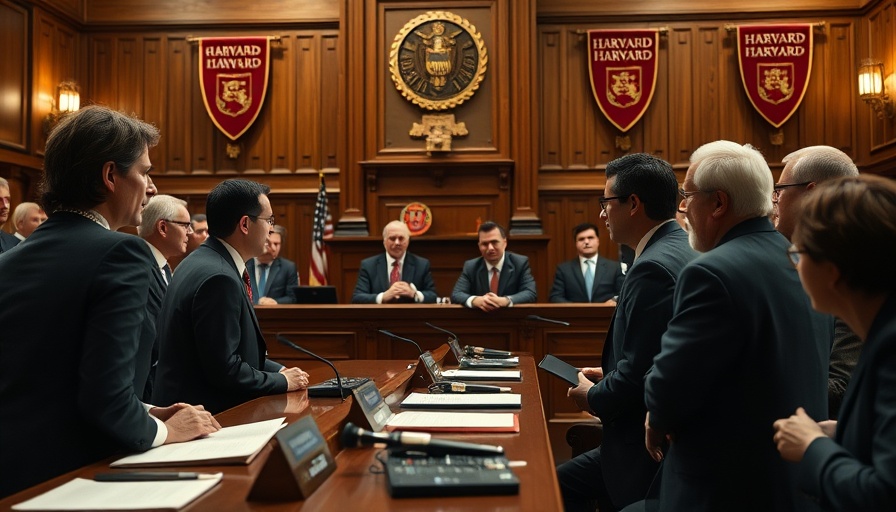
The Looming Shadow of Legal Battles: Harvard vs. Trump
The intersection of education and politics is rarely a smooth one, and the legal battles surrounding Harvard University and former President Donald Trump are the latest manifestation of this complex dynamic. As Harvard finds itself embroiled in a lawsuit challenging its admission practices, many are questioning not just the legal implications, but the broader societal impacts as well. This case raises significant questions about the future of affirmative action, educational equity, and the role of politics in higher education.
Understanding the Core Issues at Stake
At the heart of this lawsuit are allegations that Harvard's admissions policies discriminate against Asian American applicants. This stems from broader criticisms concerning racial biases in university admissions across the nation—a hot-button issue that has intensified under recent presidential administrations. Regardless of the court's ruling, it is evident that the implications of this lawsuit will resonate far beyond the academic realm.
Political Capital and Public Sentiment
Political figures on both sides have weighed in. Supporters of the lawsuit argue that ending perceived discriminatory practices is vital for ensuring fairness within the education system. Conversely, opponents warn that such actions threaten the principles of diversity and inclusion that many educational institutions strive to uphold. This division illustrates how education has become a focal point for political activism, particularly in an era where educational policies are frequently influenced by electoral politics.
The Ripple Effects of Court Decisions
As Harvard's case unfolds, it could set a precedent affecting universities across the United States, influencing how admissions offices assess applications. If the court rules against Harvard, it could encourage other institutions to re-evaluate their admission criteria, which could lead to significant changes in diversity initiatives. On the flip side, a ruling in favor of Harvard may embolden universities to defend traditional affirmative action policies more vigorously.
Future Predictions: What Lies Ahead?
The implications of this case extend beyond just one university. Should the Supreme Court engage with this issue, as many predict, the conversation around affirmative action could shift dramatically, influencing future presidential campaigns and education reform agendas. Think tanks and policy groups are already gearing up for what might be a transformative moment for education policy in the U.S.
Counterarguments and Diverse Perspectives
Beyond the legal arguments, there’s a broad spectrum of perspectives regarding the role of race in admissions. Those in favor of affirmative action contended that it is essential to counteract historical inequalities that persist today. However, others argue that filtering candidates based solely on race is itself a form of discrimination. This ongoing debate encapsulates the difficulties many institutions face in seeking a fair balance between merit and diversity.
The Emotional Impact on Students and Families
For many aspiring students, the outcomes of this lawsuit are more than just legal decisions; they are deeply personal. Families have invested so much in academic preparation, only to be left in uncertainty about whether their applications will be fairly assessed. Conversations around college admissions often carry heavy emotional weight, influencing not just individual students but entire communities that feel either upheld or marginalized by these decisions.
The Public's Role in Shaping the Narrative
The discourse surrounding education and affirmative action is very much alive in public opinion forums. From social media campaigns to town hall discussions, many community members actively engage in dialogue about these critical issues. The more informed they become, the more they can influence the political landscape, pushing for transparency and accountability in educational equity.
Decisions You Can Make with This Insight
For those advocating for educational reform, understanding the nuances of this case can provide strategic insight for activism. Engaging with local representatives, participating in community discussions, or simply educating oneself about the nuances of educational policy can empower individuals to make their voices heard in a rapidly changing landscape.
Final Reflections
As the legal proceedings continue, it’s essential to keep the bigger picture in mind. The fate of Harvard's admissions policy is just one piece of a larger tapestry that reflects ongoing societal struggles over race, equity, and the principles of education in America. Whether you are a student, educator, or concerned citizen, the outcomes of this case will undoubtedly shape the future of higher education.
 Add Row
Add Row  Add
Add 




Write A Comment